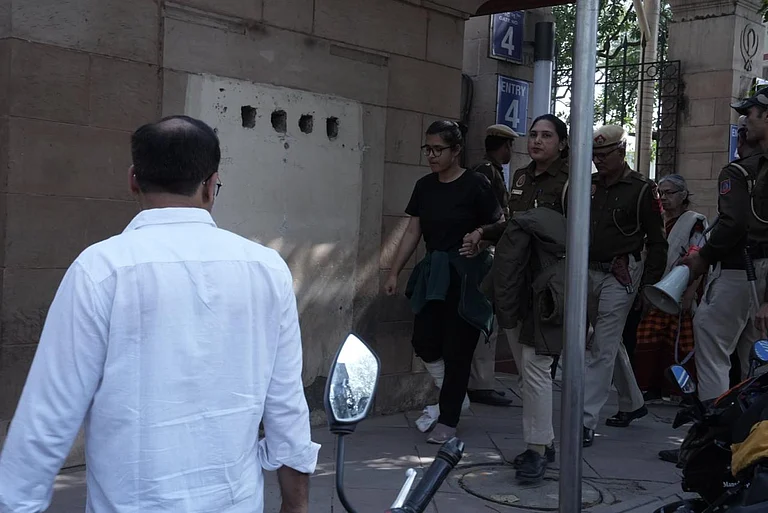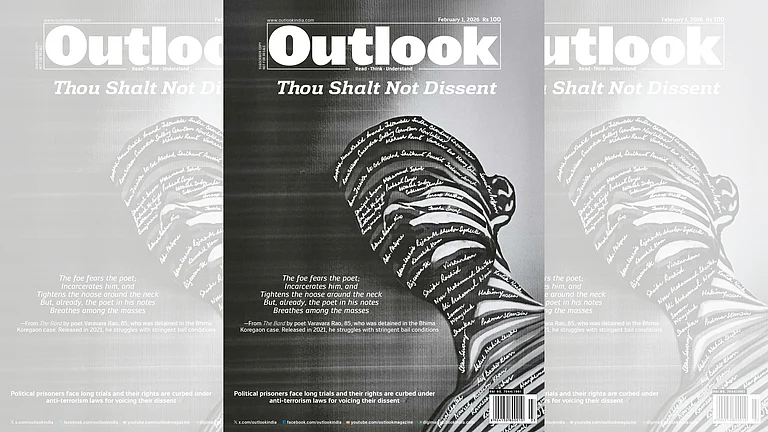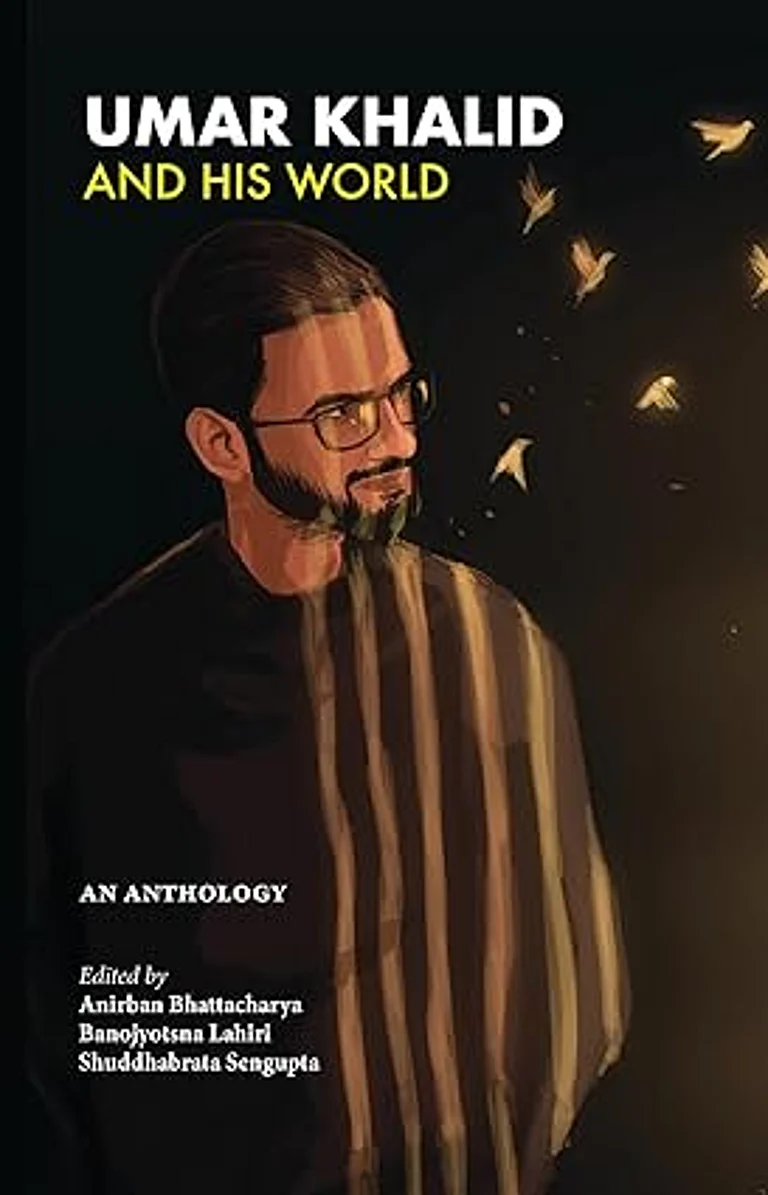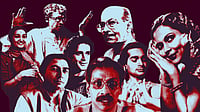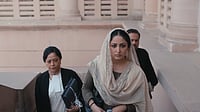On January 5, 2026, the Supreme Court is set to announce its judgement on the bail pleas of anti-CAA activists Umar Khalid, Gulfisha Fatima, Sharjeel Imam, Shifa Ur Rehman, Mohd. Saleem Khan, Meeran Haider and Shadab Ahmad in the Delhi riots 2020 larger conspiracy case under FIR 59/2020. All the accused have been in jail for close to six years now and their bail pleas have been rejected twice each by the lower court as well as the Delhi High Court. Human rights organisations across the globe have highlighted the inordinate delay in trial and the prolonged incarceration that the undertrials have faced in this case. Recently, eight U.S. Congressmen also wrote to the Indian Ambassador Vinay Mohan Kwatra, urging India to "uphold the rights of individuals" to be granted bail and receive a fair and speedy trial.
In the light of this, we revisit this account of visiting Umar Khalid in Tihar jail penned by Apeksha Priyadarshini, Khalid's friend. This appeared in Outlook's October 2023 issue, 'All Is Well'.
I started visiting Umar Khalid—a former JNU student leader who was arrested on alleged charges of ‘conspiracy’ in the 2020 Delhi pogrom case—in Tihar Jail about one and a half years ago. When his arrest took place in September 2020, the entire country was reeling from the consequences of the nationwide lockdown that had been in effect due to the Covid pandemic. It took a long time for physical visits to begin in prison and when they did, there was a tedious protocol in place to determine who can visit the prisoner. There are not only restrictions in terms of the number of people who are allowed visitations, but also the frequency at which a prisoner can have the privilege of having visitors.
The process of actually visiting is a tedious one. One has to make a booking for the visit well in advance. Once you are there on the allotted date, you must surrender everything you have, except your ID and things that you are allowed to take for the prisoner—very basic amenities like money, which must be deposited separately at a counter inside into the prisoner’s account; a limited number of clothes or a blanket; and, legal documents, if any. As you enter the gates, the prison security takes its time to scan every article that you are carrying to give to the prisoner. The prison staff patiently dissects everything—strings are pulled out of pyjamas; sharp tags or decorative elements are slashed off from clothing with a blade; and, there are even specific colours that you aren’t allowed to take inside! During winters, the prison personnel carefully cut open the razais to see if anything is hidden inside. There’s something very deeply discomforting about the condition in which basic belongings are passed on to the prisoners, torn and tattered, searched rigorously with an inherent sense of suspicion. You see the eyes of the officials constantly searching you along with the things that you have brought, to sense if you are hiding something, thereby criminalising you along with your loved ones.
Umar says that being caged for a long duration chips away at your restlessness to be free. One starts to forget what life seemed to be like on the outside.
You then stand in long-winding lines for hours to get a pass printed for the visitation at the counter. And then, you go through the various levels of security checks. There is checking at multiple metal detectors while you surrender your shoes, belts and articles on a scanner belt. You are marked physically for clearance after a deep frisk of your body by stern hands and piercing gazes. Everything from your ID number to your address, family details and biometrics is recorded and you are allowed to move ahead only after they are sure that you can in no way hold anything contentious. Once one heads onto the long-winding passages that lead to the actual mulaqat (meeting) area in the respective prisons, one realises what it must be like to live in an absolute surveillance society. Here is a world within a city, crowded with watchtowers at every juncture, where a gunman is positioned, looking over the prisoners 24x7. There is an eerie silence, except for the banter of the guards; even the chirping of birds is scant.

Standing Up For Umar: Members of the Welfare Party of India protest against the arrest of Umar Khalid in Kolkata Photo: Getty Images
In the mulaqat area, you submit your pass, put in your thumbprints, and then wait for them to bring the prisoner from their cell. In recent times, this process has been made even more bureaucratic and painstaking for UAPA (Unlawful Activities (Prevention) Act) undertrials. One must often wait up to two hours for the paperwork exchange to happen amongst the security officials. Finally, you are allowed to talk to your loved one from across a filthy double-layered fibre glass, using a landline phone set. On most days, finding a working phone set and a window where the glass isn’t too murky is a huge challenge.
Meeting Umar in Tihar has been an exercise of deep reflection on many fronts—interrogating the symptoms of the rot festering in our society; understanding the quotidian nature of the injustice that is meted out to the socially marginalised among us; the deep desire embedded within us for human interaction and intimacy; and, our collective capacity for resilience and hope. A large part of my visits has involved listening to his own astute observations on the life of a prisoner, and how telling it is about the social realities beyond the iron bars.
Our discussions have ranged from the funny and the mundane to the macabre and the unbearable. He tells me about the ways in which graded inequalities—that are at play in society at large—become much cruder within jail. The environment inside the prison is constantly made tense with whatever happens on the outside, be it the violent attacks on Muslims on an everyday basis or toxic films that further demonise them. He tells me how he finds it increasingly difficult to criticise the current regime in front of anyone in the jail anymore, because instead of a criticism of the government, it is received as an attack by a Muslim on “Hindu sentiments”. He explains to me that this regime has empowered the downtrodden in a bizarre and dangerous manner, not necessarily to safeguard their interests and for the betterment of their conditions, but by ensuring that they too are able to find themselves the will to oppress those below them in the social rung.
Memory, too, begins to betray you on the inside, he tells me. He often tries to remember the names of the people in our friends’ circle when we talk.
In the past three years, Umar’s main engagement throughout his incarceration has been reading. He reads up to five different newspapers in a day, and it has offered him pertinent perspectives on the status of the news media in our country today. “You see, what goes out as Hindi news media, especially the highest-circulating newspapers, is basically designed like a gossip tableaux. There’s a need for someone to really study their stories that pass off as ‘news’. I was reading a story on Aftab Poonawalla which was headlined, ‘Ishq di galli vich tukde tukde’. The article was squarely blaming live-in relationships for what happened—this, going out as ‘news’ to hundreds of households, is an alarming phenomenon. What kind of implications is this going to have on women and their choices?” The question is haunting, but the news headline is only symptomatic of the decay, both of journalism as well as the society in which such journalism is breeding.
While some conversations between us have been about his analysis of the life inside, we have often also spoken about how he is engaging with his situation personally. Umar frequently says how prolonged incarceration changes a person fundamentally from within. He says that being caged for a long duration chips away at your restlessness to be free. One starts to forget what life seemed to be like on the outside. “One realises that the life we lead on social media, where we are constantly peeking into and keeping a tab on the lives of others, is quite stressful, and ironically, the silence of your cell starts to become more and more familiar,” he tells me. He makes poignant observations on the cycle of a person getting accustomed to prison. “In the beginning, when a new person comes, they often sit close to the bars of their cell to peek outside in the yard. But as time passes, you notice how the person keeps receding deeper into the cell, and becomes comfortable with its quiet interiority.”
Memory, too, begins to betray you on the inside, he tells me. He often tries to remember the names of the people in our friends’ circle when we talk. He has asked for our pictures to be sent along with the books. “In prison, we try to visualise people’s faces to remember because the monotony of the days and the isolation make you forget. I don’t remember so many names anymore. When the Delhi High Court judgement came, I thought about the first day I stepped into Tihar—to think of what I did back then to reconcile with my situation. And I couldn’t remember. I remember the books I have read during this time, but I hardly remember the days.”
On one occasion, I asked him if the prison gets to him. He says, “You know, it feels like quicksand. Sometimes you just feel like you’re sinking in deeper and deeper and there’s no way out. You know that concept in photography called time lapse? That’s what I imagine myself like sometimes. Like I’m sitting, and people around me keep coming and leaving, the seasons keep changing, the time keeps passing, and I’m just still. At night, they make announcements about who is going to leave the next day; who has got bail; and, sometimes, I can’t help but pin my hopes on these announcements and think, one day, they will also call out my name.”
While the legal journey of his bail petition keeps hitting roadblocks in different courts, what keeps Umar going is the knowledge that there are people on the outside who have not forgotten that he and the other equal citizenship activists like Gulfisha, Sharjeel, Khalid, Meeran, Shifa, Athar, Shadab, Salim and Tasleem are still in prison. It matters to him that his ideas continue to be used to make sense of what is going on in our country today and that whatever he shares with those of us who meet him during these mulaqats, holds relevance to the ways in which we plan our struggle against the current regime in the times to come.
How soon he will be released is a question that remains to be answered in the near future. But when he does come out and the tides do turn, the experiences that Umar and the other political prisoners have undergone during incarceration will remain one of the most critical testaments to the very turbulent history of our times. And they will continue to hold unforgettable lessons for the future citizens of this country.
(Views expressed are personal)
Apeksha Priyadarshini is a PH.D scholar at the school of arts and aesthetics, Jawaharlal Nehru University (JNU), New Delhi. She is a member of Bhagat Singh Ambedkar Students’ Organisation, JNU









